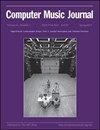关于这个问题
IF 0.4
Q4 COMPUTER SCIENCE, INTERDISCIPLINARY APPLICATIONS
引用次数: 0
摘要
在这期的第一篇文章中,Mark Zaki采访了Hubert Howe,他是半个多世纪以来活跃的计算机音乐作曲家。20世纪60年代,作为普林斯顿大学的研究生,Howe参与开发了音乐4B项目,这是Csound的前身。采访从他早年在该领域的经历,一直到他目前担任纽约市电声音乐节的总监。Howe详细介绍了他的一些作曲技巧,包括在他的电子和声学作品中使用音高阵列,以及他在计算机音乐中使用的音色方法。Curtis Roads是本杂志的前编辑,因其在微声作曲方面的长期职业生涯而闻名,包括他创造的第一个计算机实现颗粒声音合成。在本期中,他和他的合著者描述了他们最新的实时交互颗粒合成软件。作为典型的颗粒合成,程序操作的声音文件,而不是实时音频输入;但用户可以实时控制许多合成参数。与许多颗粒合成软件不同,该系统提供逐颗粒处理,这意味着每个颗粒可以有一组独特的值,特别是包络线、波形、幅度、频率、空间位置和滤波。作者还强调了图形用户界面的设计。通过本文章由计算机程序翻译,如有差异,请以英文原文为准。
About This Issue
In this issue’s first article, Mark Zaki interviews Hubert Howe, who has been an active composer of computer music for over half a century. As a graduate student at Princeton University in the 1960s, Howe co-developed the Music 4B program, an antecedent of Csound. The interview progresses from his early years in the field through to his current directorship of the New York City Electroacoustic Music Festival. Howe details some of his compositional techniques, including the use of pitch arrays in his electronic and acoustic pieces, as well as his approach to timbre in computer music. Curtis Roads, a former editor of this journal, is well known for his long career in microsound composition, including his creation of the first computer implementation of granular sound synthesis. In this issue, he and his co-authors describe their recent software for real-time interactive granular synthesis. As is typical in granular synthesis, the program operates on sound files rather than real-time audio input; but the user has real-time control of many synthesis parameters. Unlike much granular synthesis software, the system offers per-grain processing, which means that each grain can have a unique set of values—specifically, for envelope, waveform, amplitude, frequency, spatial position, and filtering. The authors also emphasize their design of the graphical user interface. By
求助全文
通过发布文献求助,成功后即可免费获取论文全文。
去求助
来源期刊

Computer Music Journal
工程技术-计算机:跨学科应用
CiteScore
1.80
自引率
0.00%
发文量
2
审稿时长
>12 weeks
期刊介绍:
Computer Music Journal is published quarterly with an annual sound and video anthology containing curated music¹. For four decades, it has been the leading publication about computer music, concentrating fully on digital sound technology and all musical applications of computers. This makes it an essential resource for musicians, composers, scientists, engineers, computer enthusiasts, and anyone exploring the wonders of computer-generated sound.
Edited by experts in the field and featuring an international advisory board of eminent computer musicians, issues typically include:
In-depth articles on cutting-edge research and developments in technology, methods, and aesthetics of computer music
Reports on products of interest, such as new audio and MIDI software and hardware
Interviews with leading composers of computer music
Announcements of and reports on conferences and courses in the United States and abroad
Publication, event, and recording reviews
Tutorials, letters, and editorials
Numerous graphics, photographs, scores, algorithms, and other illustrations.
 求助内容:
求助内容: 应助结果提醒方式:
应助结果提醒方式:


